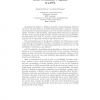Free Online Productivity Tools
i2Speak
i2Symbol
i2OCR
iTex2Img
iWeb2Print
iWeb2Shot
i2Type
iPdf2Split
iPdf2Merge
i2Bopomofo
i2Arabic
i2Style
i2Image
i2PDF
iLatex2Rtf
Sci2ools
PSSE
2004
Springer
2004
Springer
Developing and Reasoning About Probabilistic Programs in pGCL
“demonic” nondeterminism, representing abstraction from (or ignorance of) which of two program fragments will be executed. By introducing probabilistic nondeterminism into GCL, we provide a means with which also probabilistic programs can be rigorously developed and reasoned about. The programming logic of “weakest preconditions” for GCL becomes a logic of “greatest pre-expectations” for what we call pGCL. An expectation is a generalized predicate suitable for expressing quantitative properties such as “the probability of achieving a postcondition”. pGCL is suitable for describing random algorithms, at least over discrete distributions. In our presentation of it and its logic we give a number of small examples, and two case studies. The first illustrates probabilistic “almost-certain” termination; the second case study illustrates approximated probabilities, abstraction and refinement. After a brief historical account of work on probabilistic semantics in Section ...
Probabilistic | Probabilistic Nondeterminism | Probabilistic Programs | PSSE 2004 | Software Engineering |
Related Content
| Added | 02 Jul 2010 |
| Updated | 02 Jul 2010 |
| Type | Conference |
| Year | 2004 |
| Where | PSSE |
| Authors | Annabelle McIver, Carroll Morgan |
Comments (0)

